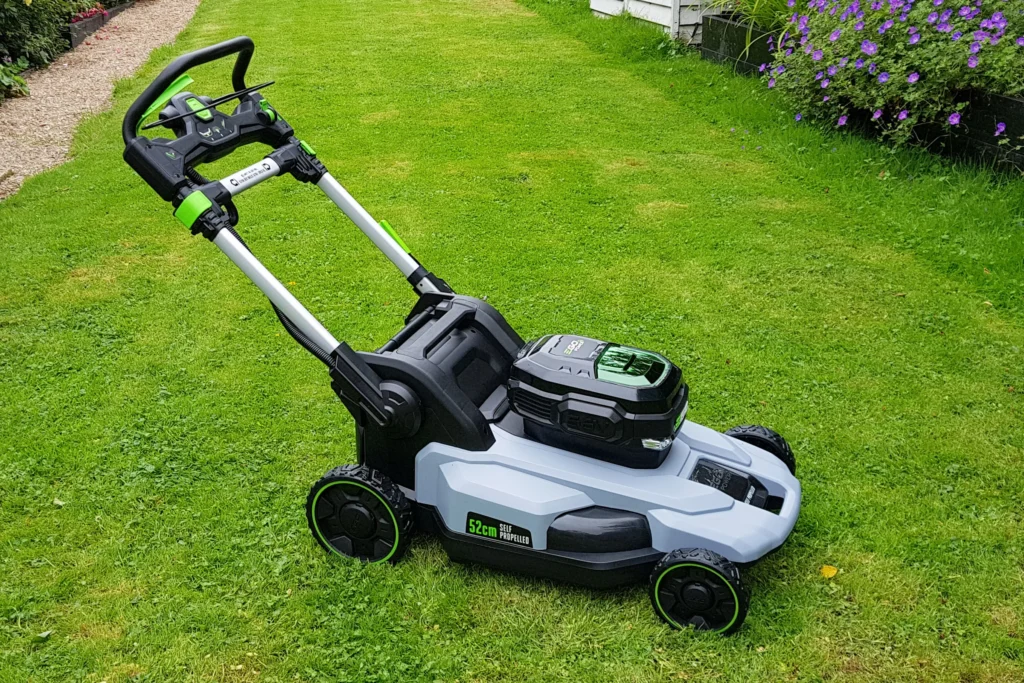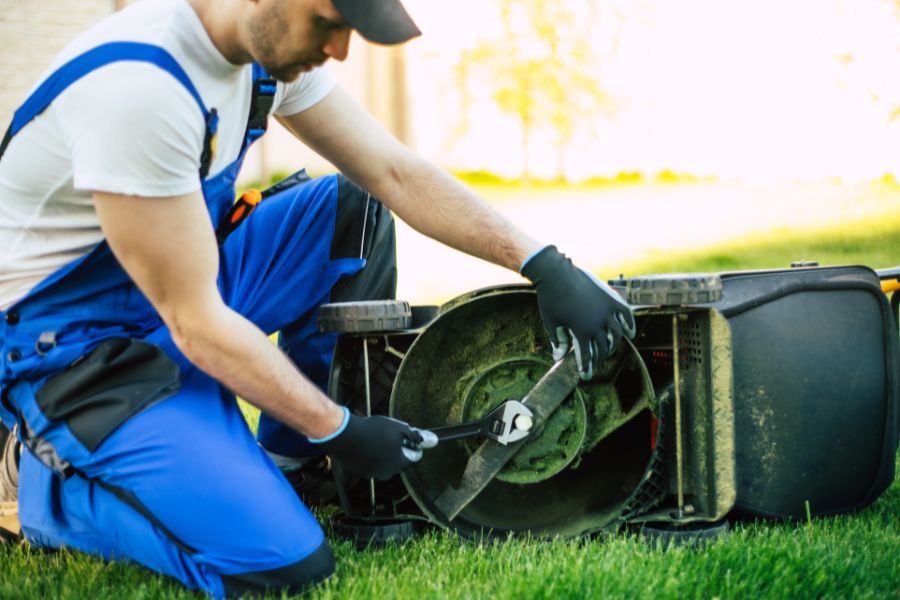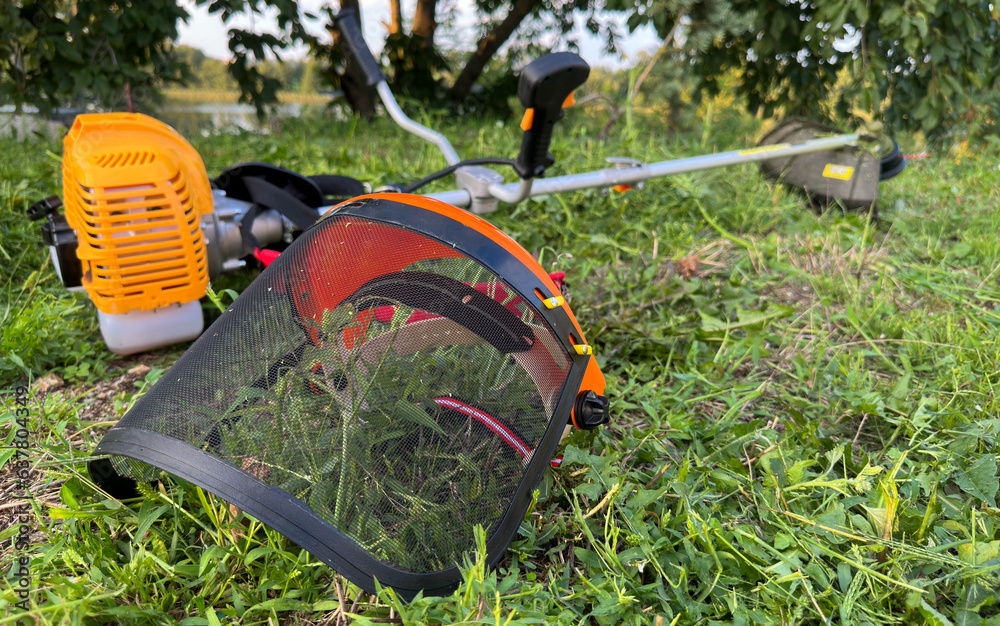A Lawnmower is a key tool for maintaining a healthy and beautiful lawn. However, improper usage can lead to safety hazards, damage, and costly repairs.

In this guide, we’ll outline what you should not do with a lawnmower to ensure your machine runs smoothly and remains in excellent condition.
1. Don’t Mow Wet Grass
One of the key mistakes in lawn care is mowing wet grass. Not only does mowing wet grass clog your lawnmower’s blades and deck, but it also leads to uneven cuts. When grass is wet, it tends to clump, which can strain your mower over time and even cause rust to develop. Furthermore, wet grass can be slippery, increasing the risk of accidents while mowing.
Pro Tip: Always wait until your lawn is dry before mowing. This practice not only ensures clean cuts but also helps maintain your lawnmower’s longevity, ultimately keeping your lawn looking its best.
Another important aspect to consider is how the height of your mower blades can affect both your lawn’s health and your mower’s performance.
2. Don’t Mow Too Short
Cutting your grass too short may seem like a quick way to maintain a tidy appearance, but it can stress your lawn. Grass that is too short struggles to photosynthesize effectively, making it vulnerable to pests and diseases. This practice can also lead to scalping, where the soil is exposed, causing bare patches that are difficult to recover.
Pro Tip: Aim to cut only one-third of the grass height at a time. This helps maintain a healthy lawn and ensures your mower operates efficiently.
As we move from cutting heights, it’s essential to also think about the maintenance of your lawnmower blades to ensure optimal performance.
3. Don’t Neglect Blade Maintenance

Neglecting to maintain your mower blades can drastically affect your cutting performance. Dull blades tear the grass rather than cut it cleanly, which can lead to brown edges and an unhealthy lawn. Furthermore, dull blades put unnecessary strain on the mower, leading to potential overheating and damage.
Pro Tip: Sharpen your mower blades at least once a season for optimal cutting. Regular maintenance extends the life of your mower and contributes to a healthier lawn.
With blade maintenance covered, let’s shift our focus to another common mistake: operating your mower without proper safety gear.
4. Don’t Forget Safety Gear

Safety should always be a priority when operating a lawnmower. Failing to wear the appropriate safety gear, such as goggles, gloves, and closed-toe shoes, can expose you to unnecessary risks. Lawn mowers can propel debris, causing injury if you’re not adequately protected.
Pro Tip: Always wear safety gear while mowing, and ensure any bystanders are at a safe distance. Taking these precautions helps minimize the risk of accidents and injuries.
Moving from safety, let’s consider the importance of understanding your lawnmower’s capabilities and limitations.
5. Don’t Overwork Your Lawnmower
Overworking your lawnmower by attempting to tackle thick grass or uneven terrain can lead to breakdowns and costly repairs. Every mower has its limits, and pushing it beyond those can strain the engine and other components.
Pro Tip: Assess your lawn before mowing. If the grass is too tall or thick, consider mowing it in stages or investing in a more powerful mower designed for tougher conditions.
As we discuss mowing conditions, another crucial aspect is ensuring your lawnmower’s fuel system is well-maintained.
6. Don’t Use Old Fuel
Using old or contaminated fuel can cause your lawnmower to run poorly or not at all. Fuel can degrade over time, leading to clogs in the carburetor and other issues. This can cause your mower to sputter, lose power, or even damage the engine.
Pro Tip: Always use fresh fuel and consider adding a fuel stabilizer if you won’t be using your mower for an extended period. This practice helps keep your engine running smoothly.
Transitioning from fuel quality, let’s discuss the importance of proper storage to prolong your lawnmower’s lifespan.
7. Don’t Store Your Lawnmower Improperly
Improper storage can lead to rust, damage, and a shorter lifespan for your lawnmower. Leaving it outside exposed to the elements can cause significant wear and tear on both the body and internal components.
Pro Tip: Store your mower in a dry, covered area, preferably indoors. If storage outdoors is necessary, invest in a protective cover to shield it from rain and UV rays.
When thinking about lawnmower use, the need for proper mowing techniques becomes even more critical.
8. Don’t Mow in the Same Pattern
Mowing in the same pattern each time can lead to compacted soil and uneven grass growth. When you always mow in the same direction, the grass learns to grow in that pattern, which can lead to ruts and bare spots.
Pro Tip: Change your mowing pattern regularly to encourage even growth and reduce soil compaction. This practice enhances the health of your lawn over time.
Transitioning from mowing patterns, let’s consider the importance of clearing your lawn before mowing.
9. Don’t Ignore Debris on the Lawn
Mowing over debris such as sticks, rocks, or toys can damage your lawnmower and lead to dangerous projectiles. This not only risks harming your equipment but can also pose safety hazards for anyone nearby.
Pro Tip: Always inspect your lawn for debris before mowing. Taking a few minutes to clear the area can save you time, money, and potential injuries.
Finally, let’s address the significance of following the manufacturer’s guidelines for your lawnmower.
10. Don’t Ignore the Owner’s Manual
Neglecting the guidelines provided in your lawnmower’s owner’s manual can lead to improper use and maintenance, resulting in unnecessary damage. Each model has specific requirements for fuel, maintenance schedules, and operational techniques.
Pro Tip: Take the time to read and understand your owner’s manual. Following the manufacturer’s instructions helps prolong the life of your mower and ensures it operates efficiently.
Read more on what you should not do with a lawnmower
Conclusion: What You Should Not Do With a Lawnmower
By avoiding these common mistakes, you can ensure that your lawnmower remains in excellent condition and your lawn looks its best. Remember, the key to successful lawn care lies in proper usage, regular maintenance, and adherence to safety precautions.
With these tips in mind, you’ll be well on your way to mastering lawn care and keeping your lawnmower running smoothly. Interested in more lawn care tips? Check out our other articles for expert advice on maintaining a healthy lawn!






